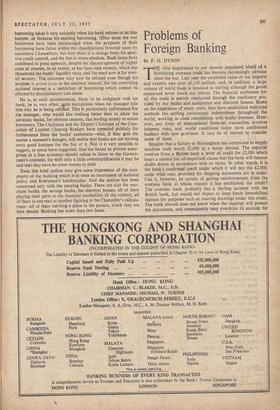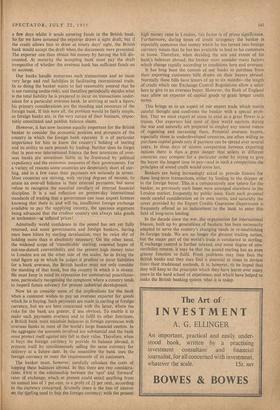Problems of Foreign Banking
BY F. G. DYSON
THE vital importance to our densely populated island of a flourishing overseas trade has become increasingly obvious since the war. Last year the combined value of our imports and exports was over £6,150 million, and, in addition, a large volume of world trade is financed in sterling although the goods concerned never touch our shores. The financial settlement for all this trade is mainly conducted through the machinery pro- vided by our banks and acceptance and discount houses. Based on the experience of many years, they have established well-tried methods for settling commercial indebtedness throughout the world, working in close relationship with banks overseas. How- ever, any form of international financial transaction involves inherent risks, and world conditions today have confronted bankers with new problems. It may be of interest to consider some of them.
Imagine that a factory in Birmingham has contracted to supply machine tools worth £2,000 to a buyer abroad. The exporter receives from a British bank a letter of credit for £2,000 which bears a modest but all-important clause that the bank will honour drafts drawn in accordance with its terms. In other words, it is the bank's confirmed credit under which it will pay the £2,000, come what may, provided the shipping documents are in order. Can it, however, be certain of getting reimbursement from the overseas bank at whose request it has established the credit? The overseas bank probably has a sterling account with the British bank, but would not expect to keep funds immobilised thereon for purposes such as meeting drawings under this credit. The bank abroad does not know when the exporter will present the documents, and consequently may overdraw its account for a few days whilst it sends covering funds to the British bank. So far we have assumed the exporter draws a sight draft, but if the credit allows him to draw at ninety days' sight, the British bank would accept the draft when the documents were presented. The exporter can then obtain his money by having the bill dis- counted. At maturity the accepting bank must pay the draft irrespective of whether the overseas bank has sufficient funds on its account.
Our banks handle numerous such ,transactions and so incur very large and real liabilities in facilitating international trade. In so doing the banker wants to feel reasonably assured that he is not running undue risks, and therefore periodically decides what is the total liability he is prepared to incur on transactions under- taken for a particular overseas bank. In arriving at such a figures' his primary considerations are the standing and resources of the foreign bank. If this were all, the problem would be fairly simple, as foreign banks are, in the very nature of their business, respec- tably constituted and publish balance sheets.
However, it has now become equally important for the British banker to consider the economic position and prospects of the country in which the foreign bank operates. It is of particular importance for him to know the country's holding of sterling and its ability to earn pounds by trading. Neither does he forget that in post-war international finance the best intentions of over- seas banks are sometimes liable to be frustrated by political expediency and the economic measures of their governments.' For a variety of reasons some countries are desperately short of ster- ling, and in a few cases their payments are seriously in arrear. Most countries are striving, with varying degrees of success, to attain an over-all balance in their external payments, but some refuse to recognise •the essential corollary of internal financial discipline. It is a sad reflection on present-day international standards of trading that a government can issue import licences knowing that thde is, and will be, insufficient foreign exchange available to pay the supplying country, the specious argument being advanced that the creditor country can always take goods in settlement—at inflated prices!
' Admittedly world confidence in the pound has not yet fully returned, and some governments and foreign bankers, having , once been bitten by sterling devaluation, may be twice shy of holding more than is absolutely necessary. On the other hand, the widened scope of 'transferable' sterling, renewed hopes of not-too-distant convertibility and the present high money rates in London are on the other side of the scales. So in fixing the total figure up to which he judges it prudent to incur liabilities for a bank overseas, the British banker must not only consider the standing of that bank, but the country in which it is situate. He must keep in mind its reputation for commercial punctilious- ness, particularly recognising the symptoms where a country tends to imperil future solvency for present industrial development.
Now let us consider some of the implications for the bank when a customer wishes to pay an overseas exporter for goods which he is buying. Such payments are made in sterling or foreign currency, but we are here concerned with the latter, where the risks for the bank are greater, if less obvious. To enable it to make such payments overseas and to fulfil its other functions, a British bank must maintain balances in foreign currencies with overseas banks in most of the world's large financial centres. In the aggregate the amounts involved are substantial and the bank must protect itself against any fall in their value. Therefore, when it buys the foreign currency to provide its balance abroad, it protects itself by simultaneously selling the same currency for delivery at a future date. In the meantime the bank uses the foreign currency to meet the requirements of its customers.
The banker must, however, carefully calculate the costs of keeping these balances abroad. In this there are two considera- tions. First is the relationship between the 'spot' and 'forward' rates of exchange, which at present could entail anything from an annual loss of I per cent. to a profit of 21 per cent., according to the currency concerned. Secondly there is the loss of interest on the sterling used to buy the foreign currency; with the present
high money rates in London, this factor is of prime significance. Furthermore, during times of credit stringency the banker is especially conscious that money which he has turned into foreign currency means that he has less available to lend to his customers at home. Therefore, when deciding the size and extent of his bank's balances abroad, the banker must consider many factors which change rapidly according to conditions here and overseas.
It has long been the custom of our banks to purchase from their exporting customers bills drawn on their buyers abroad. Normally these bills have tenors of up to six months—the length of credit which our Exchange Control Regulations allow a seller here to give to an overseas buyer. However, the Bank of England may allow an exporter of capital goods to grant longer credit terms.
This brings us to an aspect of our export trade which merits careful thought and confronts the banker with a special prob- lem. That we must export or cease to exist as a great Power is a truism. Our exporters lost most of their world markets during the war and naturally are prepared to employ any sound means of regaining and increasing them. Potential overseas buyers, especially those in underdeveloped countries, are often willing to purchase capital goods only if payment can be spread over several years. In these days of intense competition between exporting nations there is thus a great danger that sellers in different countries may compete for a particular order by trying to give the buyer the longest time to pay—and in such a competition the principles of sound credit would come last.
Bankers are being increasingly asked to provide finance for these long-term transactions, either by lending to the shipper or to the foreign buyer. This is a comparatively new Sphere for the banker, as previously such loans were arranged elsewhere in the London market, frequently by public issue. Each such proposal needs careful consideration on its own merits, and naturally the cover provided by the Export Credits Guarantee Department is frequently offered as an inducement to the bank to enter this field of long-term lending.
In the decade since the. war, the organisation for international finance, built up by generations of bankers, has been necessarily adapted to serve the country's changing needs in re-establishing its foreign trade. We are no longer the greatest trading nation, but the major part of the world's trade is conducted in sterling. If exchange control is further relaxed, and some degree of cdn- vertibility returns, it may be that the pound sterling has an even greater function to fulfil. Fresh problems may then face the British banks and they may find it essential at times to deviate from their traditional methods. it is. hoWever, to be hoped that they will keep to the principles which they have learnt over many years in the hard school of experience, and which have helped to make the British banking system what it is today.



















































 Previous page
Previous page